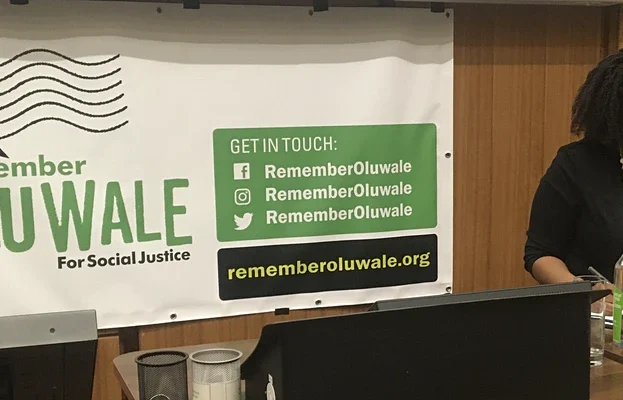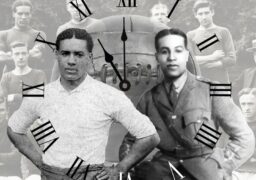
Dr Kennetta Hammond Parry explains how David’s story illuminates the way the British State works
Welcome to the first David Oluwale Annual Lecture. We are delighted that the noted historian Dr Kennetta Hammond Parry has accepted our invitation to return to Leeds. (In the photo she is delivering the Leeds University ‘Racism and Resistance’ annual lecture.) This is a ‘pay as you feel’ event. Really, it’s fine to pay £1. All donations are used to support the educational and campaigning work of the #RememberOluwale charity. There will be refreshments served after the lecture and Q&A. We are most grateful to the School of Cultural Studies & Humanities at Leeds Beckett University and to the Lipman-Miliband Trust for their support for this event. The venue, in the Rose Bowl at LBU, is highly accessible, but please contact us if you have special needs we can attend to.
Brief description of the lecture: David Oluwale’s story provides an unlikely introduction into the history of a nation. His is a history mostly recorded in the instances when he came to the attention of police, medical personnel, welfare officers and other authorities responsible for administering services rendered to citizens by the state. Yet despite living the majority of his life as a Black man in the shadows— homeless, precariously employed, repeatedly incarcerated, dependent on the state and in a country with fleeting familial connections or community networks—David Oluwale’s life provides an essential vantagepoint for understanding how the dynamics of race, class, gender and lack of status shaped what it means to be British.
Brief Biography: Dr Kennetta Hammond Perry serves as founding Director of the Stephen Lawrence Research Centre and is a Reader in History at De Montfort University in Leicester, UK. She is currently writing a book focussing on David Oluwale. Her research interests include regional histories of Black Britain, transnational race politics, Black women’s history and histories of statecrafted violence. She has published a number of scholarly articles and a book on African Caribbean migration and the politics of race and citizenship in postwar Britain titled London is the Place For Me: Black Britons, Citizenship and the Politics of Race (Oxford, 2016).
Further information:
The life and death of David Oluwale has much to tell us about the contours of modern British history. As someone who entered the historical archive largely by way of his legal transgressions as documented by those who viewed him as criminal, disreputable and undeserving of the entitlements and protections of British citizenship, David Oluwale’s story provides an unlikely introduction into the history of a nation.
This talk will focus on how reckoning with David Oluwale’s story unsettles our view of Britain’s Black histories. In particular it will highlight some of the ways that David Oluwale’s journey to Britain complicates our understanding of London-centric narratives of the so-called ‘Windrush Generation,’ which often overlook the various imperial roots and routes that helped to shape Black life in postwar British cities like Leeds. More importantly, it will suggest that interrogating David Oluwale’s life and the conditions that facilitated his death with care and consideration lends itself to excavating a vision of British history—its violence, its indignity, and its inhumanity—that is easily recognisable to Black people in Britain, yet is routinely denied or disavowed within the national collective memory. Making these stories visible is part of the political work of Black British history. And David Oluwale’s story is one that is indispensable to our understanding of the persistence of racial injustice.
Dr Kennetta Hammond Perry serves as founding Director of the Stephen Lawrence Research Centre and is a Reader in History at De Montfort University in Leicester, UK. Before assuming her current post, she was previously an Associate Professor of History and Co-Director of the Programme in African & African American Studies at East Carolina University in the USA. Her research interests include regional histories of Black Britain, transnational race politics, Black women’s history and histories of statecrafted violence. She has published a number of scholarly articles and a book on African Caribbean migration and the politics of race and citizenship in postwar Britain titled London is the Place For Me: Black Britons, Citizenship and the Politics of Race (Oxford, 2016). Currently she is completing a book, David Oluwale’s Britain: A Political History of Black Life which takes the life and death of David Oluwale as a point of departure for rethinking the contours of Black British history.








